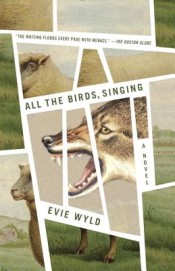 Evie Wyld
Evie Wyld
Vintage ($15.95)
by Lori Feathers
Jake Whyte, the protagonist of Evie Wyld’s slim novel All the Birds, Singing, attracts attention despite her ardent desire to be left alone and farm sheep on a remote British isle. With her large, muscular frame and contempt for soft or pretty things, Jake exudes physical strength, but beneath her tough self-sufficiency she is emotionally vulnerable and fearful. In depicting how Jake gains self-awareness, Wyld has created an entertaining novel that is pleasurable and also deeply unsettling.
Jake’s self-imposed social and physical isolation is misunderstood by the locals. Apart from her neighbor Don she has no friends; her refusal to participate in the community and her masculine appearance make easy fodder for the village teens who taunt and harass her. When Jake finds the brutally maimed bodies of two sheep in her flock she automatically suspects the teens. But she begins to have doubts after she senses something large and menacing in the woods near her home, and when a stranger, Lloyd, shows up unexpectedly on her property.
The fast-paced narrative of Jake’s attempts to resolve who or what is killing her sheep is interspersed with flashbacks from her life in Australia. An unintended act of arson during high school caused her to run away from home for good. Homeless and hungry, she tried to scrape by with odd janitorial jobs until she discovered the relative easy money of working as a prostitute. Later, she is rescued from prostitution by Otto, a client, but flees his home after being victimized by his perverse need to control her and her suspicion that his wife’s death may not have been from natural causes. After running from Otto, Jake landed with an all-male crew of itinerant sheep shearers in the Australian outback and won their begrudging respect as their equal in strength and ability. These glimpses of Jake’s former life brings her personality and character into satisfying focus; we empathize with her and feel regret for the misfortunes that spiraled from her youthful mistake.
All the Birds, Singing is Wyld’s second novel and it has rightfully earned accolades and awards, most recently as the United Kingdom winner of the 2014 European Union Prize for Fiction. The writing is confident, and it shares a similar tone and context with Per Petterson’s Out Stealing Horses—both Petterson and Wyld use lean prose to reveal the interior lives of their protagonists; both Jake and Trond from Out Stealing Horses live in self-imposed isolation in a harsh, untamed locale that requires acute awareness of the natural environment in order to survive.
Wyld’s pacing and deliberate ambiguities are highly effective in creating an atmosphere of suspense. When and how will the sheep-killing beast next strike? Is the creature real or just a product of Jake’s imagination? To heighten the sense of dread and in a nod to the novel’s title, Wyld punctuates some of the most suspenseful scenes with birds’ cries.
And she follows in the tradition of the literary horror genre by imbuing her novel with symbolism, in this case allusions to the Old Testament’s Samson to whom God granted great physical strength as long as he did not cut his hair. First, Jake’s neighbor, Don, has a son named Samson, and he is Jake’s alter ego. A troubled young man, Samson, like Jake in her youth, is homeless and on the run following acts of arson; also like Jake, Samson has sightings—the ghost of his deceased mother—that leave him with persistent anxiety. Second, both Don and Lloyd, at different points in the novel, try to persuade Jake to cut her long, unruly hair, and Jake refuses until almost the final page. When Jake, at last, allows Lloyd to cut her hair, contrary to the Old Testament story Jake gains newfound emotional and spiritual strength. For the very first time she doesn’t run from the monster in the night but stands and confronts it head on.
Like Jake’s visions, the novel’s ending is inconclusive and open to interpretation—great book club material. It is reported that a movie based on the novel is in development; one can only hope that the cinematic version of Wyld’s novel conveys her sharp observations of human nature, the need for community, and the universal wisdom that only by facing your fears can you take the first and necessary step to find your home and establish your place in the world.

